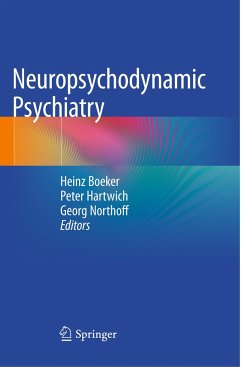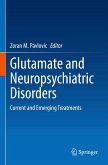Neuropsychodynamic Psychiatry
Herausgegeben:Boeker, Heinz; Hartwich, Peter; Northoff, Georg
Neuropsychodynamic Psychiatry
Herausgegeben:Boeker, Heinz; Hartwich, Peter; Northoff, Georg
- Broschiertes Buch
- Merkliste
- Auf die Merkliste
- Bewerten Bewerten
- Teilen
- Produkt teilen
- Produkterinnerung
- Produkterinnerung
This book presents a comprehensive neuropsychodynamic strategy for treating psychiatric disorders. Rather than pursuing an exclusively biological, psychological, or psychodynamic approach, it offers a methodology that links all three aspects in a unifying, integrative model. Central to this approach is the view of the brain as a bio-psychosocial organ in a neuro-ecological model, rather than the purely neuronal model often presupposed in current neuroscience and psychiatry. Moreover, the book views psychopathological symptoms as spatiotemporal disorders of the altered spatiotemporal structure…mehr
Andere Kunden interessierten sich auch für
![Neuropsychodynamic Psychiatry Neuropsychodynamic Psychiatry]() Neuropsychodynamic Psychiatry135,99 €
Neuropsychodynamic Psychiatry135,99 €![Childhood Trauma in Mental Disorders Childhood Trauma in Mental Disorders]() Childhood Trauma in Mental Disorders112,99 €
Childhood Trauma in Mental Disorders112,99 €![Childhood Trauma in Mental Disorders Childhood Trauma in Mental Disorders]() Childhood Trauma in Mental Disorders82,99 €
Childhood Trauma in Mental Disorders82,99 €![Recovery and Major Mental Disorders Recovery and Major Mental Disorders]() Recovery and Major Mental Disorders160,49 €
Recovery and Major Mental Disorders160,49 €![Recovery and Major Mental Disorders Recovery and Major Mental Disorders]() Recovery and Major Mental Disorders87,99 €
Recovery and Major Mental Disorders87,99 €![The Science and Practice of Lithium Therapy The Science and Practice of Lithium Therapy]() The Science and Practice of Lithium Therapy128,99 €
The Science and Practice of Lithium Therapy128,99 €![Glutamate and Neuropsychiatric Disorders Glutamate and Neuropsychiatric Disorders]() Glutamate and Neuropsychiatric Disorders171,99 €
Glutamate and Neuropsychiatric Disorders171,99 €-
-
-
This book presents a comprehensive neuropsychodynamic strategy for treating psychiatric disorders. Rather than pursuing an exclusively biological, psychological, or psychodynamic approach, it offers a methodology that links all three aspects in a unifying, integrative model. Central to this approach is the view of the brain as a bio-psychosocial organ in a neuro-ecological model, rather than the purely neuronal model often presupposed in current neuroscience and psychiatry. Moreover, the book views psychopathological symptoms as spatiotemporal disorders of the altered spatiotemporal structure spanning the brain and its surrounding world. The relation between one of the core symptoms and altered neuronal activity calls for the development of integrated, circular neuropsychodynamic models of psychopathological symptoms in severe psychiatric disorders and their treatment.
Produktdetails
- Produktdetails
- Verlag: Springer / Springer International Publishing / Springer, Berlin
- Artikelnr. des Verlages: 978-3-030-09152-1
- Softcover reprint of the original 1st edition 2018
- Seitenzahl: 652
- Erscheinungstermin: 22. Dezember 2018
- Englisch
- Abmessung: 235mm x 155mm x 33mm
- Gewicht: 1091g
- ISBN-13: 9783030091521
- ISBN-10: 303009152X
- Artikelnr.: 57807762
- Herstellerkennzeichnung Die Herstellerinformationen sind derzeit nicht verfügbar.
- Verlag: Springer / Springer International Publishing / Springer, Berlin
- Artikelnr. des Verlages: 978-3-030-09152-1
- Softcover reprint of the original 1st edition 2018
- Seitenzahl: 652
- Erscheinungstermin: 22. Dezember 2018
- Englisch
- Abmessung: 235mm x 155mm x 33mm
- Gewicht: 1091g
- ISBN-13: 9783030091521
- ISBN-10: 303009152X
- Artikelnr.: 57807762
- Herstellerkennzeichnung Die Herstellerinformationen sind derzeit nicht verfügbar.
Boeker, Heinz, MD, Prof. Dr. med. studied medicine at the Universities of Freiburg (Br.) and Giessen, Germany. He completed his doctoral thesis in psychosomatic medicine in the Department of Internal Medicine at the University of Giessen. He was trained in paediatric and adolescent psychiatry, neural-paediatrics, neurology, psychiatry and psychotherapy/psychoanalysis in Hamburg, Giessen and Frankfurt/Main, Germany. He completed his habilitation thesis at the University of Zurich. From 1996 till 2015 he worked at the Psychiatric University Hospital Zurich, Head of the Centre of Depression, Anxiety Disorders and Psychotherapy. Heinz Boeker is Professor of Clinical Psychiatry at the University of Zurich. He is member of the International Psychoanalytical Association (IPA). Since 2016 he works in a private psychiatric practice in Zurich. His scientific work focuses on qualitative research of the personality of depressed patients, therapy research, and combined neuropsychological and neuroimaging studies in depression. He heads the research group "Therapy and Process Research". More than 170 articles in peer reviewed journals and book contributions, twelve monographs, eleven editorships. Member of several boards of reviewers and editors. He is one of the leading advocates of psychoanalytic psychotherapy in psychiatry and neuropsychodynamic psychiatry. Website link: www.heinzboeker.com Hartwich, Peter, Prof. Dr. med. psychiatrist, psychoanalyst, neurologist, forensic psychiatrist, works in clinical field with all kinds and especially severe psychiatric inpatients and outpatients for more than 38 years. Coeditor European Archives of Psychiatry and Neurological Sciences for 10 years, Habilitation (qualification as a university lecturer) Subject of scientific investigation: Schizophrenia and cognitive disturbances, an empirical investigation, published by Springer, Berlin-Heidelberg-New York 1980, apl. Professor University ofAachen. Director and head doctor of the specialist clinic and department for psychiatry, psychotherapy- psychosomatic at the general hospital of Frankfurt, teaching hospital of the University of Frankfurt am Main. Scientific work: more than 150 papers and chapters in books; selection of books: Hartwich, P. (1980) Cognitive disturbances in schizophrenia. Springer,Heidelberg-New York. Hartwich, P. (Germany), Fryrear, J.L. (USA) (2002, eds.) Creativity: The Third Therapeutic Principle in Psychiatry. Wissenschaft & Praxis, Sternenfels , Hartwich, P. Grube, M. (2015) Psychotherapie bei Psychosen (Psychotherapy on Psychoses). 3. ed. Springer, Berlin-Heidelberg ; Böker, H., Hartwich, P., Northoff, G. (eds.) (2016) Neuropsychodynamische Psychiatrie (Neuropsychodynamic psychiatry). Springer, Berlin-Heidelberg. As author and co-author: 10 chapters. Supervisor in psychodynamic psychotherapy in Frankfurt/M, Berlin, Munich, Dresden. Georg Northoff, MD, PhD, FRCP is psychiatrist, neuroscientist and philosophers and works on the neuronal and neuropsychodynamic correlates of mental features like self and consciousness and psychopathological symptoms. He is a well-recognized expert in brain imaging of mental features and psychiatric disorders and one of the leading advocates of neuropsychoanalysis and neurophilosophy. His main focus these days is on resting state activity and its spatiotemporal structure and how that links to mental features including psychopathological symptoms. He is author of over 200 articles in neuroscience, psychiatry, and philosophy, published 14 academic books, and also 4 books for the wider audience including most recently "Neurophilosophy and the healthy mind. Learning from the unknown brain" (Norton 2016). Website link: www.georgnorthoff.com
I Neuropsychodynamic Foundations.- Why neuropsychodynamic psychopatology?.- Psychoanalysis and Neuroscience: The development of Neuropsychoanalysis.- Social embedded brain and relational self.- Threedimensional neuropsychodynamic model of mental disorders and defence mechanisms.- II Basic psychoanalytic concepts and their development.- Unconscious.- Childhood, adolescence and development.- Affects.- Transference and countertransference.- III Neuropsychodynamics of psychiatric disorders.- Schizophrenia and other psychoses.- Depressive syndroms.- Manic and bipolar syndroms.- Anxiety disorders.- Obsessive-compulsive disorders.- Somatisation and bodily distress disorder.- Anorexia and Bulimia.- Traumatogenic disturbances.- Personality disorders.- Dissociative syndroms.- Addiction.- IV Neuropsychodynamic Perspectives.-Principles of neuropsychodynamic therapy.- Acute psychiatric wards.- Neuronal substrates of depression: implications for psychotherapy.- Mood disorders units.- Day clinic models.- Day clinic treatment for depression and anxiety disorders.- Psychoanalytic therapy of Borderline-Personality-Disorder in day-clinic-setting.- Neuropsychodynamics and creative therapy.- Neuropsychodynamic musictherapy.- Four psychotherapeutic settings.- Psychotherapy, Psychopharmacotherapy, and Neuromodulation.- Psychotherapy research in the context of neurosciences.- Concepts of empirical and clinical research in Psychoanalysis and Neuropsychodynamic Psychiatry.- Dreams.- Chronic depression Leuzinger.- Neurophilosophy and Neuroethics.- Outlook: Neuropsychodynamic Psychiatry and the impact of therapeutical relationships.
I Neuropsychodynamic Foundations.- Why neuropsychodynamic psychopatology?.- Psychoanalysis and Neuroscience: The development of Neuropsychoanalysis.- Social embedded brain and relational self.- Threedimensional neuropsychodynamic model of mental disorders and defence mechanisms.- II Basic psychoanalytic concepts and their development.- Unconscious.- Childhood, adolescence and development.- Affects.- Transference and countertransference.- III Neuropsychodynamics of psychiatric disorders.- Schizophrenia and other psychoses.- Depressive syndroms.- Manic and bipolar syndroms.- Anxiety disorders.- Obsessive-compulsive disorders.- Somatisation and bodily distress disorder.- Anorexia and Bulimia.- Traumatogenic disturbances.- Personality disorders.- Dissociative syndroms.- Addiction.- IV Neuropsychodynamic Perspectives.-Principles of neuropsychodynamic therapy.- Acute psychiatric wards.- Neuronal substrates of depression: implications for psychotherapy.- Mood disorders units.- Day clinic models.- Day clinic treatment for depression and anxiety disorders.- Psychoanalytic therapy of Borderline-Personality-Disorder in day-clinic-setting.- Neuropsychodynamics and creative therapy.- Neuropsychodynamic musictherapy.- Four psychotherapeutic settings.- Psychotherapy, Psychopharmacotherapy, and Neuromodulation.- Psychotherapy research in the context of neurosciences.- Concepts of empirical and clinical research in Psychoanalysis and Neuropsychodynamic Psychiatry.- Dreams.- Chronic depression Leuzinger.- Neurophilosophy and Neuroethics.- Outlook: Neuropsychodynamic Psychiatry and the impact of therapeutical relationships.








